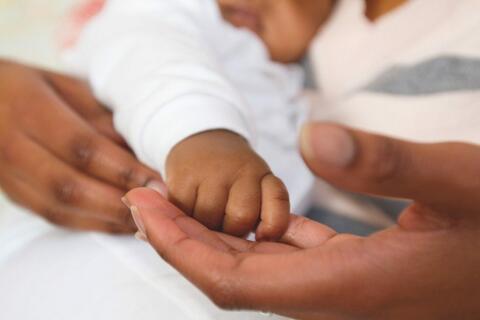Nurture NJ, First Lady Tammy Murphy’s statewide effort to improve maternal and infant health is making strides to reach communities of color with services that address black infant mortality.
Officials said in a statement, "as part of this effort, the New Jersey Department of Health has increased outreach, support and services to women of color to improve health and birth outcomes."
As part of its $4.7 million investment in the Healthy Women, Healthy Families program, the Department has provided funding for partners to hire 77 outreach workers — 40 doulas, eight Community Health Workers and 29 Community Health Worker supervisors — to improve the health of black women.
More than 11,000 women have been screened since July 2018 and 8,500 were connected to programs like Home Visiting and Healthy Start. Most of these women were pregnant and nearly 40 percent reside in communities with high rates of black infant mortality.
Sixty-three women are participating in the doula pilots. To date, 19 have delivered their child with the support of a doula.
In addition, 600 more women have been provided long-term, reversible contraception (LARC) thanks to Governor Phil Murphy’s restoration of family planning funds.
DOH is also announcing that seven partners have agreed to administer 17-alpha-hydroxyprogesterone (17P) through funding that the Department has secured from the CDC, as part of the Preventative Health Services Block Grant. 17P is proven to prevent preterm births in certain women.
To ensure maternal care providers have an understanding of how this intervention can be used to improve birth outcomes, the Department, with perinatologists and obstetric experts, will offer Grand Rounds at hospitals and medical societies to areas of the state with high infant mortality rates.
“Every mother deserves an equal chance at having a healthy child,” said First Lady Murphy. “Through the Nurture NJ initiative, the administration is making strides in bringing services to communities that need greater access to care, in order to reduce shameful disparities that have persisted in our state for too long. Our goal is to make New Jersey the safest place to give birth in the country.”
First Lady Murphy has made it her top priority to reduce infant mortality. The First Lady has traversed the state over the past year meeting with stakeholders to better understand the depth of the crisis, and raise awareness that New Jersey's black infants are three times more likely than white infants to die before their first birthday.
The First Lady launched Nurture NJ, a multi-pronged, multi-agency campaign focused on reducing maternal and infant mortality and morbidity, and ensuring equitable maternal and infant care among women and children of all races and ethnicities.
“Community Health Workers and Doulas provide support and connections to resources that can greatly improve a women’s health and the likelihood she will have an optimal birth,” said Health Commissioner Dr. Shereef Elnahal. “Thanks to the First Lady’s leadership, underserved minority women are receiving services in their own backyards.”
Eight community-based grantees are implementing the Healthy Women, Healthy Families and Doula Pilots:
The Partnership for Maternal & Child Health of Northern New Jersey (Bergen, Morris, Passaic, Union and Hudson counties; cities of Paterson and Jersey City)
Central Jersey Family Health Consortium (Middlesex, Somerset,
Hunterdon and Mercer counties; city of Trenton)
Greater Newark Healthcare Coalition, Inc. (Essex County and the municipalities of East Orange, Irvington and Newark)
Project Self-Sufficiency of Sussex County (Sussex and Warren counties)
Southern New Jersey Perinatal Cooperative (Atlantic, Cape May, Salem
Gloucester, Cumberland, Burlington and Camden counties; cities of Atlantic City and Camden)
The Children's Home Society of New Jersey (Monmouth and Ocean counties).
Children’s Futures (Trenton)
SPAN Parent Advocacy (Newark)
“This innovative work by our grantees is being generously supported by the Nicholson Foundation, the Burke Foundation and The Henry and Marilyn Taub Foundation,” added Dr. Elnahal. “We thank them for sharing our commitment to reduce these longstanding health inequities.”
Under Nurture NJ, the Department’s Healthy Women, Healthy Family Initiative and Doula pilot targets high-risk populations, which includes those who are low-income and/or uninsured, women with chronic health conditions and multiple social or economic stressors, victims of domestic violence, those impacted by mental health issues, alcoholism and substance abuse, women with minimal social supports and women with unintended pregnancies.
These women on average attend fewer prenatal visits and are more likely to experience adverse pregnancy outcomes.
Their families are less likely to access consistent, comprehensive preventive and primary care services, and are less likely receive quality care.
One of the measures to prevent preterm births, a contributor to infant mortality, is to increase access to family planning options.
When women are able to plan and space their pregnancies, based on many factors including a woman’s health prior to conception, infant mortality decreases.
To reduce unintended pregnancies in the state, the Department is increasing access to long-term, reversible contraception (LARC) as a contraception option for women.
Thanks to the $7.5 million in state family planning funding that Governor Murphy restored and has continued to fund, the New Jersey Family Planning League has seen an increase in more than 600 women taking advantage of this conception option, which includes intrauterine devices (IUDs) and hormonal implants.
This increase of six percent puts the Department on target to surpass its goal of increasing uptake of LARC use by 15 percent over 5 years.
Infant mortality is a key measure of population health that reflects the underlying wellbeing of mothers and families. Given the impact social determinants of health play in women’s health, the Department partnered with the National Association of Chronic Disease Directors to hold a health equity training for 120 key partners and stakeholders, which included representatives from grantees, community organizations and sister agencies.
For more information on the Nurture NJ campaign and the Department’s Maternal and Child Health initiatives, visit the Nurture NJ website and the Department’s website.
